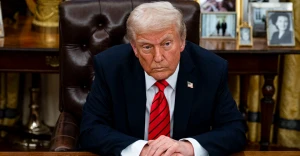
EU explores seizure of Russia’s frozen $280 billion
The EU is examining legal ways to seize Russia's frozen assets to support Ukraine, amid opposition from member states like Germany and France
Bloomberg reported that EU officials are exploring the idea of using the assets as collateral for a planned International Claims Commission, which would assess compensation owed to Ukraine. If Russia refuses to pay, the assets could be seized.
According to sources familiar with the discussions, the value of the confiscated assets would be offset by Russia’s liability for war damages, which could become part of a future peace settlement.
US President Donald Trump recently intensified his criticism of Ukrainian President Volodymyr Zelenskyy, calling him an unelected dictator and blaming Ukraine for Russia's invasion. In response, Zelenskyy urged European leaders to increase their support amid concerns that the US, a key provider of weapons and financial aid, might scale back its assistance.
The EU, along with the Group of Seven countries and Australia, has frozen approximately $280 billion in Russian central bank assets, primarily held by the Belgium-based clearing house Euroclear. An additional $58 billion in assets belonging to prominent Russian individuals, including properties, yachts, and private jets, have also been frozen, according to US Treasury estimates.
The European Commission did not immediately respond to a request for comment. However, EU economy and financial services chiefs Valdis Dombrovskis and Maria Luís Albuquerque stated that all possible options, including the seizure of Russian central bank assets, should be considered to support Ukraine.
Another proposal under discussion involves empowering EU member states to confiscate Russian sovereign assets to compensate for damage to Ukraine’s energy infrastructure. Officials are examining whether a ruling from the International Criminal Court and the severity of Russia’s attacks could provide sufficient legal grounds for such action under national laws.
However, several member states, including Germany and France, oppose the full confiscation of assets due to the potential legal, economic, and diplomatic consequences. They are concerned that such a move could undermine the euro’s international standing.
The EU's diplomatic service and some member states are evaluating whether judicial decisions would be required to justify the asset seizure or if a damage assessment alone would suffice, according to Bloomberg. The European Central Bank has also voiced concerns about the proposal.
Adding complexity to the issue, the G-7 has already leveraged profits from the frozen Russian assets to secure a $50 billion loan for Ukraine.
The European Commission informed EU ambassadors this week that negotiations to establish the International Claims Commission will begin on March 24, with the issue set to be discussed during a meeting of foreign ministers on Monday.
The new commission will be tasked with evaluating damage claims and determining the precise amount Russia should pay.
“There can also be no justice without compensation,” European Commission President Ursula von der Leyen said earlier this month, when the EU initiated the process of creating the International Claims Commission.
“Russia must be held accountable for its aggression – and it must pay,” she added.
- Russia may agree to the use of its frozen assets, totaling $300 billion, for Ukraine’s reconstruction as part of a peace agreement but will insist that part of the funds be spent on the temporarily occupied territories.
- News












































